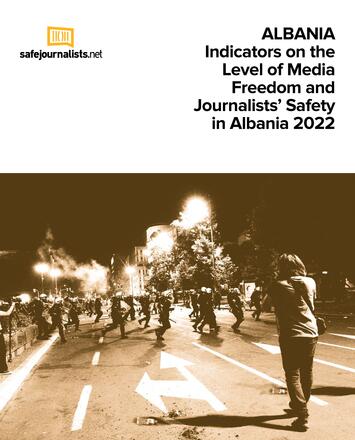
The Albanian Constitution guarantees freedom of expression, media, and information. However, signs of deterioration in these areas were consistently observed throughout 2022. The lack of independence of investigative journalism, and media pluralism, as well as state control of the media are among the areas which emerged as the most problematic. Harsh defamation laws, high fines, SLAPP threats, and criminalization continue to have a chilling effect on freedom of expression and media sustainability. During elections, the media must be able to report campaigns fairly; however, too often prejudice and discrimination against minor political parties affect fair reporting. Beyond election campaigns, a serious issue is represented by the practice of political parties providing media outlets with ready-made footage that is broadcasted without any independent inquiry, giving some parties an advantage over others. While journalists don't need a licence, media accreditation regulations of public institutions favour journalists affiliated with media organisations, disadvantaging freelancers, bloggers, and independent journalists. The lack of transparency, a consequence of limited access to information due to delays and refusals on the part of public institutions, can hamper journalists' efforts to select sources and investigate sensitive issues. Additionally, changes to the Right to Information Act proposed in October 2022 raise concern about the challenges posed to transparency and investigative reporting.
The economic restrictions imposed on the journalistic community in Albania in 2022 triggered several challenges and problems. These include workers' rights issues such as late payments, inadequate social security benefits, long working hours, a lack of leaves, and illegal lay-offs. Such a trend indicates that formal contracts alone are not sufficient to fully implement workers' rights. Salary disparities also exist, with some journalists receiving high salaries and others receiving minimal, leading to income inequality that threatens the independence and integrity of journalism. Private media lacks editorial independence due to several interconnected factors, such as limited resources, overlapping roles, partisan influence, and links between media owners and political or business interests. Public broadcasters also face challenges to their editorial independence due to concerns over bias, government intervention, defamation lawsuits, and cyberattacks. Non-commercial media has gained editorial independence but faces financial constraints, limited access to public information, and SLAPPs. Journalists might also face the influence of media owners, politicians, and other influential people in selecting news stories and during the production process, often leading to self-censorship. Female journalists experienced gender discrimination, harassment, and pay gaps, which contributed to gender inequality in the media industry.
In 2022, there were numerous incidents involving non-physical threats and harassment of journalists in Albania. These included incidents of police insulting journalists on social media, intimidation over media coverage, and the Prime Minister calling reporters undesirable at a press conference. There have also been reports of cyberattacks against media companies after publishing sensitive content. In addition, nine cases of physical attacks on journalists, including attacks by police officers, were registered. Although the security of journalists is theoretically guaranteed by the Constitution and international standards, Albania has no specific legislation addressing journalist safety concerns. State agencies lack clear procedures, resources, and data to effectively protect journalists in accordance with the European Convention on Human Rights, leading to inconsistent treatment. There has been some cooperation between independent agencies and journalistic organisations, but more systematic protocols are needed. Because Albania's court system lacks specialised departments to deal with intimidation and violence against journalists, independent reporting is hampered. Law enforcement agencies do not allocate sufficient resources to these cases, making investigations often time-consuming and ineffective. Similarly, the confidential nature of investigations limits the transparency of the process. Finally, the lack of professional legal services and safeguards tailored to the needs of journalists further exacerbates an already challenging situation. Training efforts are underway to raise the awareness and capacity of law enforcement and judicial professionals, but a more systematic approach is needed.
Tags: Albania Media freedom Media pluralism Safety of journalistsThe content of this article can be used according to the terms of Creative Commons: Attribution-NonCommercial 4.0 International (CC BY-NC 4.0) . To do so use the the wording "this article was originally published on the Resource Centre on Media Freedom in Europe" including a direct active link to the original article page.

